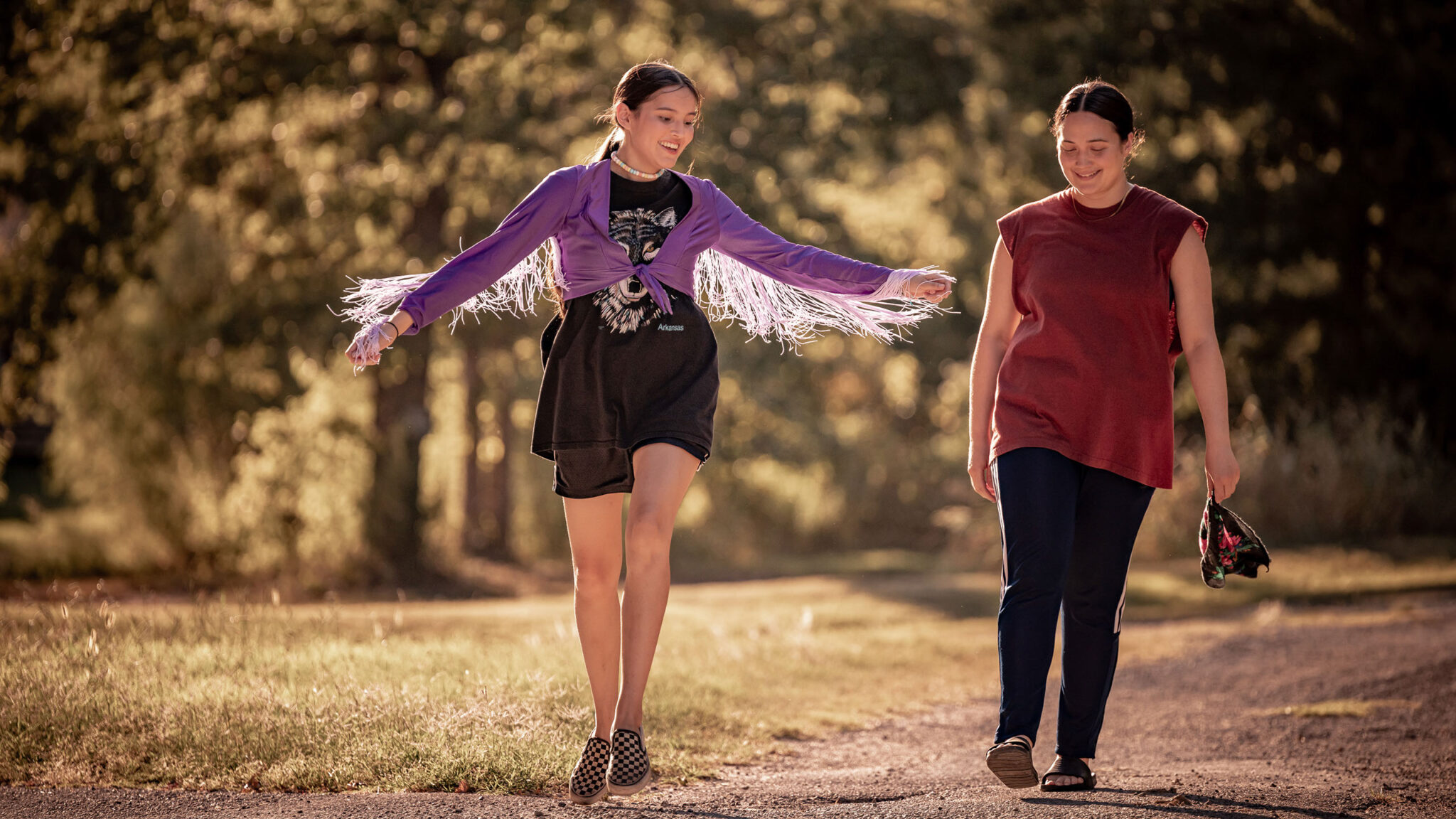It’s been quite a year for Best Actress Oscar nominee (and one-time favourite to win) Lily Gladstone, the first Indigenous person from the U.S. to be nominated. Some of us first recognized Gladstone as a great talent in Kelly Reichardt’s 2016 film Certain Women where they played a queer rancher: Gladstone solidified themself as a rare actor who can entrance an audience with just a look.
While I was glad they were being recognized for their role in Martin Scorsese’s Killers of the Flower Moon, I was also disconcerted that Gladstone’s well-deserved new level of fame didn’t translate into a release for queer Indigenous writer-director Erica Tremblay’s great Fancy Dance (Miciana Alise co-wrote the script). It premiered nearly a year and a half ago at Sundance Film Festival and stars Gladstone in a queer role.
As Gladstone generated attention on the red carpet throughout awards season, often wearing clothing and jewellery from Indigenous designers, then won a Golden Globe and SAG award, I thought, well, surely now someone will pick up Fancy Dance. Apparently I wasn’t the only one: a go-for-broke op-ed for the Hollywood Reporter wondered why the film still didn’t have a distribution deal as of November. Gladstone took a little time off from the awards campaign for Killers to join Tremblay in a Washington Post Live stream essentially pleading for Fancy Dance’s release. All of this effort (eventually) worked: earlier this year Apple Original Films picked up the film and it opened in theaters June 21 in the U.S. and Canada and will stream on Apple TV+ starting June 28.
In this sun-dappled yet noir-tinged thriller, Gladstone plays Jax, the sole guardian for her 13-year-old niece Roki (a radiant Isabel Deroy-Olson). Roki’s mother, Tawi, went missing a couple of weeks before the film’s start. Jax and her family are Seneca-Cayuga (they, like all the Indigenous roles in the film, are played by Indigenous actors), live on a reservation in Oklahoma and speak Cayuga to each other. Director Tremblay is Seneca-Cayuga herself and was the story editor on the acclaimed TV series Reservation Dogs (which recently ended after a three-season run on FX). She imbues Fancy Dance with the same level of detail. We see quickly that the reservation has a very limited number of ways to make a living: police officer, social worker, nude dancer, drug dealer and small-time scammer: Roki acts as Jax’s apprentice when the two steal a wallet and a truck from a white man in the film’s first scenes.
Fancy Dance is the kind of film in which characters make the worst possible decisions—which are not usually my favourite films—but Hollywood has been asking us to root for white male characters who do this shit (often with a white supremacist, vigilante agenda) forever. This film becomes a radical reframing of that trope, transferring our empathy to a queer Indigenous woman whose agenda is completely different.
Jax just wants to find her sister. Everywhere she goes, she has her sister’s “missing” posters in hand. She even passes them out at the local strip club, Tailfeathers, where her girlfriend works. She calls the FBI, who have jurisdiction over the case, as they do in many federal cases on tribal land to see if they’ve even started the investigation, and she regularly leads search parties that turn up nothing. She asks nearly everyone she meets if they have seen her sister—even those she’s warned, for her safety, not to ask. Usually Jax looks closed off—but when she asks about her sister, her poker face falls away.
Roki still does have hope that her mother will turn up alive, and repeatedly asks Jax if she thinks Tawi will show up to the mother-daughter dance at the big powwow in another part of the state. “She hasn’t missed one yet,” Jax chirps, though she, like the rest of the adults, including her police officer brother (Ryan Begay) realize the chances of Tawi’s return, like that of other missing Indigenous women, diminish with every passing day.
Because Jax has an old drug conviction, Roki is eventually taken by the state to live with Jax and Tawi’s white father, whom Roki barely knows. The grandfather and his white wife don’t speak Cayuga, and they’re in no rush to take Roki to the powwow. When Jax tells her father that he should call the FBI himself because they are more likely to listen to him than her, he’s immediately defensive, explaining, as the scene implies he has many times before, that he “can’t help” being white. Roki’s placement outside of her culture is a timely plot point: the U.S. Supreme Court ruled on a case just last year that threatened to (but did not) chip away at the fairly recent rights of Indigenous children to live with guardians from their own communities, including their blood families.
The old haunts where we saw Roki and Jax together, the river and lake, the yard full of old cars where they parked the stolen vehicle, become the setting through which we find out what happened to Tawi.
Jax is butch, though not above taking off her shirt—revealing a modest sports bra underneath—to distract the white guy while Roki gets his wallet. She doesn’t let her long hair loose from its single pulled-back braid. As in Certain Women, Gladstone doesn’t go the glamorized, Hollywood butch route: she looks like a butch woman one would see in a club or sporting event—or a powwow.
Jax runs through the gamut of emotions in this film, sharing a laugh with Roki about a white ICE agent who stops them even though his roots in the country are not nearly as old as theirs. She nearly bursts into tears of grief and fright as she talks to the drug dealer, and in her last scene with Roki (Deroy-Olson, in a breakthrough performance, more than holds her own opposite Gladstone), she gives her niece a look that says, “I got you. Everything will be okay”—in spite of the future she knows they both face.


 Why you can trust Xtra
Why you can trust Xtra


